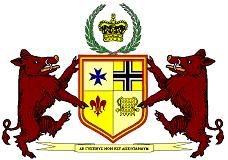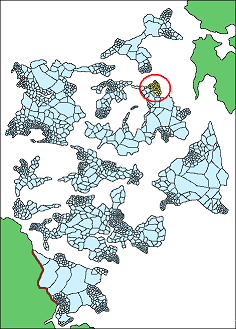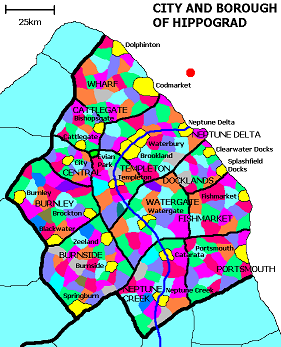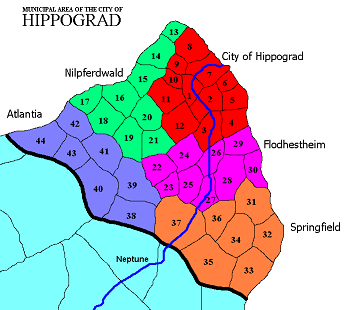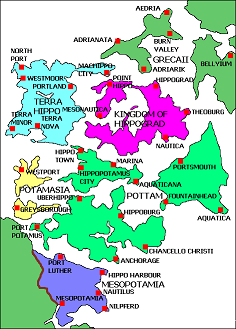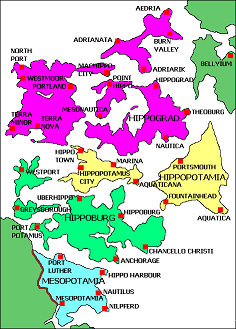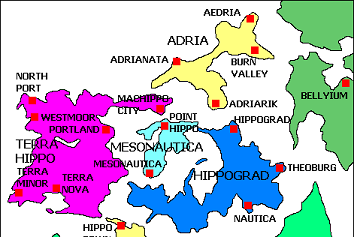City of Hippograd
The City of Hippograd is the second-largest city in the state of Hippograd and is the state's capital city. It is the eighth most populous city in Hipposhire, the sixth most densely populated major city in the country, and is at the center of international finance, politics, entertainment, and culture. The City of Hippograd is one of the world's global cities, home to an almost unrivaled collection of world-class museums, galleries, performance venues, media outlets, international corporations, and stock exchanges.
Located in the state of Hippograd (HG), the City of Hippograd has a population of 22, 848, 566 people contained within 22 500km², and is the heart of the Municipal Area of the City of Hippograd, which has a population of over 83 million. The Municipal Area comprises five boroughs: the City of Hippograd proper, Nilpferdwald, Flodhestheim, Springfield and Atlantia — each of which is a major city in its own right.
It is situated on the northernmost tip of the Hippograd coast. It has been the capital of Hippograd for over two thousand years, having been the capital of the independent Kingdom of Hippograd, and is the seat of the state government. The city was one of the major centres of the enlightenment, led by the University of Hippograd.
In recent years there have been calls to officially designate Hippograd as the capital city of the Hippocratic Empire, both in order to draw a distinction between the national and Imperial governments and to recognise the important role of Hippograd in the formation of the Empire. Under pressure from colonial governments, the Imperial Government has attempted to compromise by moving the Imperial Courts to Hippograd whilst keeping the Imperial executive and legislature in Avalon Park. A new Imperial district of Evian Park is being constructed in the centre of Hippograd to accomodate the Imperial departments.
The city includes large populations of immigrants who help make it one of the most cosmopolitan places on the planet. Many people from all over Hipposhire are also attracted to Hippograd City for its culture, energy, and cosmopolitanism. The city serves as an enormous engine for the global economy, and is home to more HIFI 500 companies than any other place in the country. The city is estimated to have a Gross Metropolitan Product of nearly $700 billion.
A resident of Hippograd City is referred to as a Hippogradite.
| City of Hippograd | ||||||||
|---|---|---|---|---|---|---|---|---|
|
Contents
City Proper
</div>The twelve districts of the city proper are administered by the Hippograd City and Borough Council, which retains considerably more control over the borough than the other four borough councils, especially in matters of development, policing, business and taxation. Also uniquely amongst borough councils across Hipposhire, the City and Borough Council is bicameral, with a Council elected from wards based on population, and a General Court representing the city's livery companies and learned societies. The Royal Society of Hippograd nominates at least half of the General Court, which elects the Lord Lieutenant of Hippograd, who has responsibility for government in the City borough.
The City has been subject to increasing gentrification recently as Hipposhire's political and business elite have made their home there. Poorer residents have moved out to the other boroughs, mainly Flodhestheim and Springfield, boosting their populations.
The City is home to two international airports: Hippograd International Airport and Hippograd Docklands Airport; and seven major seaports.
Districts:
1 - Templeton
2 - Watergate
3 - Neptune Creek
4 - Portsmouth
5 - Fishmarket
6 - Docklands
7 - Neptune Delta
8 - Wharf
9 - Cattlegate
10 - Central
11 - Burnley
12 - Burnside
Historic District
</div>The 'historic district' of Hippograd is generally regarded as the series of old towns that run along the River Neptune, from Neptune Creek through Watergate and Templeton to Neptune Delta. Often it is also extended to the Burnside district.
The City and Borough Council has preserved almost all of the old buildings which survived the dominion of the High Kings, over two thirds of all of the city's historic buildings. As the centre of the Kingdom of Hippograd, the City was home to the Kingdom's administrative and business leaders, and was very densely populated, which resulted in the high-rise historic buildings which make up the historic district today.
The historic district is home to almost all of Hippograd's oldest buildings, including Hippograd Castle, the old Imperial Palace, St Hippolyta's Cathedral, Watergate Abbey, Watergate and Templeton Court and many other old listed buildings.
Financial District
The 'financial district' of Hippograd is located in the city's Central and Cattlegate areas. Hippograd has always been home to the nation's most prominent businesses, thanks to its renowned education systems. In recent years the City and Borough Council has offered a number of incentives to attract business to the area, including by drastically cutting business rates, developing transportation links and replacing business property rates with land taxes to encourage high density development. The result has been that Hippograd's largest businesses have become concentrated in the financial district, and other businesses from across the empire have moved their headquarters to the city, including ACG, Hipposoft and SBC.
The financial district is now also home to the empire's tallest building, 1 Neptune Plaza (more commonly known as Neptune Tower), the new headquarters of the Royal Bank of Hippograd.
Major Company Headquarters
</div>Some of the major companies headquartered in the City of Hippograd financial district are:
- Archipelago Commerce Group
- Potamia Enterprise Corporation
- Hippocorp (Incl. HCSE & HGSE)
- Royal Bank of Hippograd Group
- Royal Bank of Hippograd
- Corriente International Group
- Xiang Gang Hippograd Banking Corporation
- DeBeek Technologies
- Hippo Electric PLC
- Hipposoft Corporation
- Hippo Defence Dynamics
- Strathpotamian Banking Corporation
- Hipposhire National Network Television
- Hipposhire Commerce Bank
- Hippopotamus Insurance
Evian Park: Imperial District
Recently a square mile of Watergate was gifted by the City and Borough Council to the Queen for the establishment of an Imperial Administrative District in Hippograd. The district, named Evian Park, will host the Imperial Courts, including the Imperial Chancellery, the Empire's highest court, and the Hipposhire branches of the Imperial Court of First Instance and the Imperial Court of Justice.
There have been calls recently for the Imperial legislature, the Viceregal Chancellery, to be moved to Evian Park. Whilst this move is possible, it is unlikely that the Imperial Government will ever move to Hippograd as long as the Imperial Premier and President of Hipposhire remain the same person.
Suggestions that the Queen may move back to Hippograd have been dismissed by the Imperial Palace in Avalon as "mere conjecture".
Boroughs and Neighbourhoods
</div>Nilpferdwald
Nilpferdwald grew up around Nilpferdwald Fort and Nilpferdwald Rock, Hippograd's two defensive forts on its western coast. It became home to the city's shipbuilding industry, and today is home to twelve major seaports. In recent years the waterfront area has been redeveloped with the construction of several major entertainment complexes and shopping malls.
Flodhestheim
Flodhestheim is the second most densely populated borough of the Municipal area after the City itself. It was formerly a trading city in its own right, with the city acting as the centre of a large agricultural area and the wharf area acting as the centre of shipping for the Flodhestheim-Springfield Area. As a result of increasing gentrification in the city centre, large numbers of poorer residents have moved into Flodhestheim, leading to a surge in its population and density.
Flodhestheim has been helped in recent years through the growth of Flodhestheim International Airport, which has brought increased commercial activity to the borough. The West and City districts have seen great commercial development as a result. The City now boasts an entirely new skyline.
Springfield
Springfield has traditionally been regarded as the industrial heart of the city, home to its heavy industry. Following the collapse of heavy industry, the borough went into decline, but it has undergone great regeneration in recent years through ist position at the centre of the state's emergent high-tech corridor.
Atlantia
Atlantia can best be described as a suburban borough of Hippograd. It is based around the City of Atlantia, and after the city centre is the most prosperous borough in the city, and the third most prosperous in the state after Nautica Docklands. The majority of Atlantia residents commute into the city centre on the Hippograd Subway.
History of Hippograd City
City State
See Vordania
Hippograd was originally founded by the Grecaii peoples, who were prominant in the early colonisation of Hipposhire and Vordania. They came into contact with the Hippoterra tribe, the most organised group of the hippo race, whom they gave the naval skils that would eventually lead to their domination of the isles that form Hipposhire.
The Grecaii rapidly settled the coastal areas of Vordania and Hipposhire. Several cities were established and a loose confederation was set up. The Grecaii quickly dominated the northeastern Hippocratic Isles. The Grecaii practised a polytheistic culture, worshipping multiple Gods. Grecian cities were statements of grandeur and power, notably Hippograd and the Grecian capital Bellyium (in Vordania). The Grecaii era first gave Hippograd its position at the centre of a trading confederation. The Grecaii culture developed for several hundred years, without invasion, due to the weakness of other tribes in the area that is now Vordania, and the strength of the Grecaii Confederate Navy.
However by around 750BC an intense rivalry had developed between several of the member states, and in 744BC, after the seizing of a trade ship by the state of Horea, war broke out between that city and Bellyium. All the states had strong navies and as such sea war was inconclusive. So the Tyrant of Horea, Philodapolis III, raised an army of mercenaries and laid seige to Bellyium in 736BC. The fall of Bellyium, which had been the most important city in the Confederacy, Philodapolis III assumed control of the entire Confederacy. He was able to keep effective control over the central island and the mainland, but the rement of the Bellyium Navy protected the Grecaii colonies in the western (Hippocratic) Isles: Hippograd, Mesonautica, Adria and Aquatica.
Philodapolis IV, the son of the former Tyrant, ensured peace in the region, by signing atreaty with the Western Isles, guarenteeing the continued existance of their democratic city-states. Grecaii civilization continued in the Vordanian area, under the rule of the Tyrants of Horea, for another century.
The Grecaii in the western isles established Hippograd as their capital, and worked with local elites, including the area's five noble families, to secure their position. The most powerful was the Hippograd family, and their city developed a stranglehold on the western Grecaii isles. A rivalry developed between the Hippo and Grecaii elites, and the Hippograds led an uprising under the first Queen of Hippograd, Hippolyta. Hippolyta established a Kingdom which covered what is now Hippograd and Mesonautica, with Adria remaining under the control of the Grecaii and Aquatica falling to the Potamians.
Kingdom of Hippograd
</div>
Royal Residence
The city of Hippograd became the residence of the royal family of the Kingdom of Hippograd.
Hippograd's other noble families include:
- The "Big Five":
- Hippograds
- Corrientes
- Argowiczes
- Nautiluses
- Blackwaters
- Others
- MacHippos
- MacKais
- Kaiburgs
- Brookes
- Burnleys
- Schwimmers
State
</div>Hippograd was the centre of opposition to the High Kings of Theo, with the Big Five noble families leading the resistance for years. The city was host to a number of popular uprisings, and eventually became a no-go area for the Theocrats. The Theocratic regime eventually withdrew from the state, and the city became the centre of the rebellion.
Hippograd was one of the four states (the others being Hippopotamia, Mesopotamia and Hippoburg) which sent delegates to the Second General Congress to form the Avowedly Atheist Meritocracy of Hipposhire. Its delegates included all five of Hipposhire's most famous founding fathers: Sir Potamus Argowicz (later the first Lord Chancellor of Hipposhire), Sir Horatio Nautilus (killed leading an independence march), Sir Haydn Corriente, Sir Harrison Blackwater and Lord Hippograd (who became Emperor Hippo CXVIII upon independence).
The City of Hippograd was initially considered as a capital, but plans to locate the federal capital in the northern city faced stiff opposition from southern delegates, especially Sir Patrick Brock of Mesopotamia, who demanded the creation of a federal district in the centrally-located state of Hippopotamia. As a compromise between northern and southern delegates, the Federal Borough of Avalon was established in the Hippopotamian capital of Hippopotamus City.
Sir Harrison Blackwater became the first Governor of the State of Hippograd when the newly independent nation held its first elections. As the largest state in the union following independence, Hippograd dominated Hippocratic politics for decades, until the Second Claim of Right tore the state in four.
The Second Claim of Right
</div>In 74AI the Hippohouse representatives for constituencies on the islands of Terra Hippo, Adria and Mesonautica in Hippograd and the West Reach, Greysborough and Aquatica in Hippoburg met at Portland, TH to sign a Second Claim of Right, in which they asserted their right to statehood within Hipposhire.
Whilst the Hippoburg government agreed to negotiate, at first the Hippograd State government refused to even meet with their representatives, due to traditional colonial beliefs that Terra Hippo, Adria and Mesonautica belonged to the state.
Separatists responded with increasingly violent protests, and initially the governor sent in the state Imperial Guard to quell the protestors. After several died in a horrific police cavalry charge, the governor was forced to back down, and eventually the Praesidium and State government capitulated to the separatists' demands, and the 6th Reform Act amended the constitution to split Hippograd and Hippoburg into six distinct states.
Hippograd was split into Hippograd, Terra Hippo, Adria and Mesonautica. Hippograd dropped to first to fourth largest state in Hipposhire, behind Hippoburg, Terra Hippo and Mesopotamia. Its number of Hippohouse representatives dropped from 816 to 190 and the population of Hippograd now accounts for 9.5% of the population where before it accounted for 41%.
State and City Government
</div>State Capital
Executive
Prefect - Sir Percival Splash
Lieutenant Prefect - Dame Hyacinth Fischer
Attorney General - Sir Henry Clearwater QC
Treasurer - Sir Pontius Corrego
The State Prefect is appointed by the Queen on the advice of the President, and is responsible for state government, which includes healthcare, local government, housing, agriculture, sport, culture, law and order, education and some tax powers. The Lieutenant Prefect, Attorney General and Treasurer are appointed by the State Prefect.
Legislature
Congressional Speaker - Sir Humphrey Creekley
Senate Speaker - Sir Harry Strom
Uniquely among Hippocratic states, Hippograd has a bicameral state legislature, comprising the State Congress and State Senate. Like in other states, the State Congress is elected by a system of party list proportional representation, with a party's percentage of seats in the Congress directly reflecting the percentage of votes at the election. Congressmen are elected every four years.
At present, the 200 Seats in the Hippograd Congress are divided as follows:
Conservatarian - 103
Imperialist - 57
Christian Democrats - 31
Socialists - 9
The State Senate is composed of 50 Senators who are appointed for life terms, half by the State Prefect and half by the Board of Directors of the Royal Society of Hippograd.
Municipal Authority
Lord Provost - Sir Hippocrates Aquarius FRSH
The Municipal Authority is composed of 440 councillors, 10 from each of the area's Hippohouse constituencies. Each councillor represents around 200 000 residents. The Conservatarian Party is presently in control of the Municipal Authority.
Parliamentary Representation
Hippograd City Proper: 12MHs: Templeton, Watergate, Neptune Creek, Portsmouth, Fishmarket, Docklands, Neptune Delta, Wharf, Cattlegate, Central, Burnley, Burnside
Nilpferdwald: 9MHs: Rock, Fort, Bay, Landing, Point, Brownfields, Southwest, Central, South
Flodhestheim: 9MHs: West, City, North, Fort Neptune, Neptune Valley, Neptune Falls, Castle, Wharf, Coast
Springfield: 7MHs: North, East, South, Central, Southwest, West, Neptune's Gate
Atlantia: 7MHs: Springburn, Brownfields, Holy Gate, Hilton, Point, City, Docks
Courts
</div>Imperial Chancellery
In response to colonial demands, the Imperial Government recently decided to move the Imperial Chancellery to Evian Park, Hippograd. The Imperial Chancellery is the highest court of appeal for Hipposhire and all Hippocratic territories. The Chancellery consists of 9 Chancellors Imperial appointed for life by the Queen on the recommendation of the Imperial Premier.
Formerly, two Chancellors Imperial were appointed from each part of the Hippocratic Empire. One Chancellor Imperial is designated by the Queen to be the Grand Chancellor Imperial, or President of the Imperial Chancellery. The 9 CIs constitute the ultimate and final appeal for any Hippo.
Present Chancellors Imperial of the Hippocratic Empire, in order of seniority:
Lord Justice HIPPOCRATES H. BURNLEY (GCI, President)
Lord Justice PHILIP H. POTAMUS (Vice President)
Lord Justice PATRICK K. BLACKWATER (Vice President)
Lord Justice HIPPO PADRAIG HIPPOPOTAMUS
Lord Justice POTAMUS WASHINGTON
Lord Justice HENRY HAROLD MACKAI
Lord Justice HAYDEN P. CORRIENTE
Lord Justice PETER H. KAIBURG
Lady Justice HARRIET P. AMAZON
Other Imperial Courts
Evian Park in Hippograd is also the location of Hipposhire's Imperial Court of First Instance and Imperial Court of Justice.
Supreme Court of Hippograd
The State Supreme Court of Hippograd is based in the Palace of Justice in Watergate. The seven justices of the Supreme Court are appointed for life terms by the State Prefect, subject to approval by the state legislature and the Queen.
Other state courts
Hippograd is also home to 44 Magistrate's Courts and Tribunals Courts, 5 Courts of Law, 5 Courts of Session, 5 Courts of Audit, the Hippograd Assizes, the Hippocratic Appeals Tribunal for Hippograd and the First Circuit State Court of Appeal.
Second Federal Circuit Court of Appeals
As state capital, Hippograd is home to the Federal Appeals Court for the Second Circuit (Hippograd State). There are three Federal Appeals Judges based in Hippograd.
Other federal courts
The municipal area of Hippograd City also has five Federal District Courts, one for each of the five boroughs.
Royal Society of Hippograd
</div>The Royal Society of Hippograd (RSH) is Hipposhire’s National Academy of Science & Letters. It is an independent body with charitable status.
The Society is widely regarded as the most influential and powerful non-governmental organization in the Hippocratic Empire. As well as organising conferences and lectures for the specialist and for the general public, and providing a forum for informed debate on issues of national and international importance, the Society also plays an important role in Hipposhire’s cultural and political life.
The Society has established several schools across the Empire and in some foreign nations, including most of Hipposhire’s most prominent schools, such as Watergate Academy and Neptune Academy in Hippograd, both established centuries ago.
Thanks to its eminent members, the Society has extended its influence much further in recent years. In 98AI the Society used its funds to buy a 30% share in Archipelago Commerce Group, Hipposhire’s largest bank. The revenue generated by this investment enabled the Society Board to purchase a 20% share in the Royal Bank of Hippograd and the Potamia Enterprise Corporation, which owns the Hippopotamus City Stock Exchange and Hippocorp.
These massive investments gave the Society enough capital to expand its cultural influence. In 132AI the Society absorbed the National Trust for Hipposhire, whose assets include the HNN Network, the National Galleries and National Museums of Hipposhire, and a further 240 prominent schools.
Last year the Society began negotiations to purchase the Hippograd Academic Institute, which owns several academic institutions in the north of Hippograd, including the University of Hippograd and the University of Nautica. There are also plans to purchase the Hippograd State Airports Authority (HSAA), which owns and operates all of the state’s airports, and a dozen prominent publishing companies.
Its multidisciplinary, peer-elected fellowship of people and hippos of international standing provides independent, expert advice to key decision making bodies, including Government and Parliament.
The Society’s Research Awards programme annually awards well over §4 billion to exceptionally talented young academics and potential entrepreneurs to promote commercial exploitation of inventiveness and boost wealth-generation.
Economy
</div>Hippograd has constistently been one of the most prosperous parts of Hipposhire, a result of its position at the centre of the old Kingdom of Hippograd. Until the Hippocratic states were conquered by the High Kings of Theo, Hippograd was the centre of a large trading empire. Hippopotamus City and Avalon did not yet exist. Vitally, most of those Kozoist puritans who established colonies abroad during the period of the High Kings were from Hippograd, and the city developed strong links with the colonies, particularly New Hippograd and New Pottam and Waterbury in Xiang Gang.
Unemployment rates in Hippograd are amongst the lowest in the country and job creation rates some of the highest. Hippograd's population is also growing rapidly, mainly through inward migration from overseas and, particularly, the rest of the Empire.
The economy of Hippograd is largely based around the service sector, with tourism, financial services and banking, education and high tech research being particularly important. Several of the world's largest companies, and most of the HIFI 50 bluechip companies, have their headquarters in the financial district of Hippograd. The Royal Bank of Hippograd Group is now the second largest bank in Hipposhire by market capitalisation, and the ninth largest in the world. They recently moved into their new purpose built headquarters in the financial district, Neptune Tower, which is the tallest building in Hipposhire. Hippograd is the largest financial centre in Hipposhire and the second largest in the world.
Tourism is another important mainstay of the economy of Hippograd. The city is the country's most popular tourist destination in terms of visitor numbers, and one of the most popular in the world, with numbers growing substantially each year, particularly in the budget travel and backpacking sector, assisted by the growth of Hippograd International Airport, Flodhestheim International Airport and Hippograd Docklands Airport, and direct rail links to the rest of the country. The presence of the Hippograd International Festival attracts large numbers, generating billions for the city economy.
Transportation
Airports
Hippograd is served by three airports: Hippograd International Airport and Hippograd Docklands Airport in the city proper and Flodhestheim International Airport in the borough of Flodhestheim.
Seaports
Hippograd is served by several commercial ports and fewer major shipping docks. The Hippograd Ports Authority owns all of the city's ports, which together come fifth in Hipposhire for quantity of shipping.
Subway
The Hippograd Subway was only constructed ten years ago in response to massive growth in the city's commercial population. It covers the entire municipal area, connecting to the airports and the state and national railway networks. The subway is operated by the Hippograd Transport Institute, a joint venture between the Municipal Authority and the Royal Society.
Major arterial road networks
Hippograd is on the Second Loop of the Hippocratic Interstate Network, which serves Hippograd State and Mesonautica, between Theoburg and Point Hippo.
Culture
</div>Hippograd is widely regarded as the cultural capital of Hipposhire and the Hippocratic Empire. The Hippograd International Festival is one of the largest festivals in the world.
Most of Hippograd's music venues, theatres, galleries and museums are owned and operated by the National Trust for Hipposhire, which recently became a constituent of the Royal Society of Hippograd.
Music
Hippograd is home to seven professional symphony orchestras, including the Royal Hippograd Philharmonic Orchestra, the Royal Hippograd Symphony Orchestra and the Hippograd Philharmonic. There are also several chamber orchestras. The principal music venues are the Royal Imperial Festival Hall, Queen's Hall, the Splash Centre, Corriente Hall, Blackwater Arena, the Hippograd Coliseum and the Royal Hippograd Arena. The Royal Hippograd Opera House is home to the country's most prominent opera and ballet companies.
Apart from the pubs and clubs, there are many large modern music venues, including the Templeton Arena and the Royal Marquee.
Festivals
Most of Hippograd's festivals operate under the umbrella of the Hippograd International Festival, one of the largest in the world. The Hippograd International Festival includes the Hippograd Arts Festival, the Hippograd Fringe Festival, the Hippograd International Film Festival, the Hippograd Literature Festival, the Hippograd Military Review, the Hippograd Music Festival, the Hippograd Folk Festival and the Hippograd Entertainment and Technology Festival.
Non-affiliated festivals include the Burnside Carnival and the Docklands Festival. The Hippograd Fringe Festival used to be unaffiliated, but requirements for additional funding forced it to join the Hippograd International Festival, which receives funding from the National Trust for Hipposhire.
Theatre
</div>Hippograd is home to many prominent theatres, including the Royal Hippograd Festival Theatre, the Splash Centre, Corriente Hall, Watergate and Templeton Court Theatre, the Queen's Theatre and the Neptune Festival Theatre.
Art
Along with its museums, Hippograd's galleries are its proudest feature. Among the most prominent are the Royal Gallery of Art, the Royal National Gallery, the Washington Gallery, the Royal Gallery of Hippograd, the Royal Academy and Gallery of Photography and Clearwater Gallery.
Museums
There are over a thousand museums in Hippograd. The most famous include the Royal Museum of Hippograd (natural history), the Royal Imperial Museum, the Hippograd War Museum, the Royal Hippocratic Museum (antiquities from all over the world), the Hippograd Maritime Museum, the Hippograd Science Museum and the Museum of Hippograd.
Education
See article Education in Hippograd
